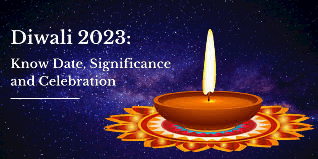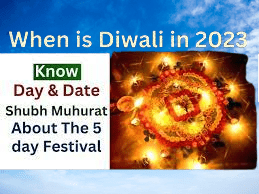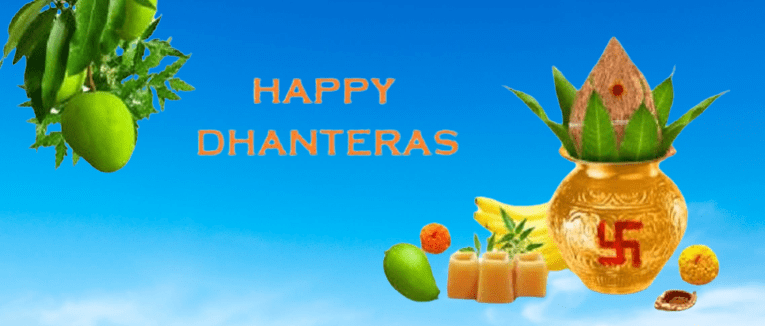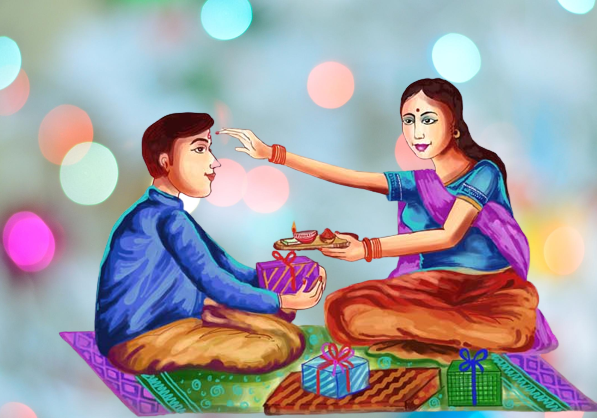Diwali 2023: Diwali, the festival of lights is an annual celebration in the month of October or November. Diwali is a five-day celebration observed in the Hindu lunisolar months of Ashvin and Kartika (mid-October to mid-November). The ancient calendar states that Diwali is celebrated annually on Amavasya or the fifteenth day of the month of Kartik. This year the festival of lights will fall on Sunday, November 12, 2023.

Diwali is observed as a Gazetted Holiday throughout the nation. According to the Hindu calendar, this year Diwali will be celebrated after 20 days of the Dussehra 2023 festival.
DIWALI 2023
Diwali is the Hindu festival of lights with its variations also celebrated in other Indian religions. It symbolises the spiritual “victory of light over darkness, good over evil, and knowledge over ignorance”. Diwali is celebrated during the Hindu lunisolar months of Ashvin (according to the amanta tradition) and Kartika—between around mid-September and mid-November. The celebrations generally last five or six days.

Diwali is connected to various religious events, deities and personalities, such as being the day Rama returned to his kingdom in Ayodhya with his wife Sita and his brother Lakshmana after defeating the demon king Ravana. It is also widely associated with Lakshmi, the goddess of prosperity, and Ganesha, the god of wisdom and the remover of obstacles. Other regional traditions connect the holiday to Vishnu, Krishna, Durga, Shiva, Kali, Hanuman, Kubera, Yama, Yami, Dhanvantari, or Vishvakarman.
During the festival, the celebrants illuminate their homes, temples and workspaces with diyas (oil lamps), candles and lanterns.
Diwali also known as Dewali, Divali, or Deepavali comes from the Sanskrit dipavali meaning ‘row or series of lights‘. The term is derived from the Sanskrit words dīpa, ‘lamp, light, lantern, candle, that which glows, shines, illuminates or knowledge‘ and avali, a row, range, continuous line, series‘.
Diwali Celebrations
In Deepavali, celebrants prepare by cleaning, renovating, and decorating their homes and workplaces with diyas (oil lamps) and rangolis (colorful art circle patterns). During Diwali, people wear their finest clothes, illuminate the interior and exterior of their homes with saaki (earthen lamp), diyas and rangoli, perform worship ceremonies of Lakshmi, the goddess of prosperity and wealth, light fireworks, and partake in family feasts, where mithai (sweets) and gifts are shared.

The festival is usually celebrated twenty days after the Vijayadashami festival, with Dhanteras, or the regional equivalent, marking the first day of the festival when celebrants prepare by cleaning their homes and making decorations on the floor, such as rangolis.
Dhanteras
Dhanteras, derived from Dhan meaning wealth and teras meaning thirteenth, marks the thirteenth day of the dark fortnight of Ashwin or Kartik and the beginning of Divali in most parts of India. The day also marks a major shopping day to purchase new utensils, home equipment, gold jewelry, firecrackers, and other items. On the evening of Dhanteras, families offer prayers (puja) to Lakshmi and Ganesha, and lay offerings of puffed rice, candy toys, rice cakes and batashas (hollow sugar cakes).

Dhanteras also known as Dhanatrayodashi is the first day that marks the festival of Deepavali in most of India.
Dhanvantari, who is also worshipped on the occasion of Dhanteras, is considered the god of Ayurveda who imparted the wisdom of Ayurveda for the betterment of mankind and to help rid it of the suffering of disease.
Dhanteras is the worship of Dhanvantari. Dhanvantari, according to Hindu traditions, emerged during Samudra Manthana, holding a pot full of amrita (a nectar bestowing immortality) in one hand and the sacred text about Ayurveda in the other hand. He is considered to be the physician of the devas.
Hindus consider this an extremely auspicious day for making new purchases, especially of gold or silver articles and new utensils. It is believed that new “Dhan” (wealth) or some item made of precious metal is a sign of good luck.
Things to Buy in Dhanteras
For quite a long time in the cultural and religious history of India, people strongly believe that doing and buying a few things on Dhanteras can open the gates to luck and prosperity. Here is a list of things to do and buy on Dhanteras to get lucky.
Dhanteras is good for starting any things that must grow progressively. You can start a new business or launch new projects on this day. This day is also a good one to start the constructions or renovations of homes and offices. During the Pradosh Kaal on Dhanteras that lasts for about two hours from sunset, it is good to perform Lakshmi Puja.
This puja is extremely important for business community to invite luck and prosperity. Some people fast on the day of Dhanteras concluding it in the evening after Lakshmi puja. A ritual known as the lighting of Yamadeep is done on this day in the evening placing the lamp at the entrance of the house. This is said to keep the god of death away from the home.
1: Buy silver or brass utensils and keep them in the eastern direction of your home.
2: Buying a broomstick on this day is said to ward off the poverty from home.
3: This is also the best day to buy electronic items like refrigerator, electric oven, laptops and mobile phones. Such things need to be kept in the north-east direction of the home.
4: Business owners can buy account books on this day and start a new account. You can also buy the stationery and tools required for your profession. Place these account books and stationery items in the western direction of the house. It is auspicious to place these objects in worship on this day.
5: Buy 11 Gomti Chakras on Dhanteras, wrap them in a yellow cloth and place the bundle in a safety locker for inviting good luck.
6: One of the most auspicious items to buy on this day is a gold coin with the image of Goddess Lakshmi imprinted on it. This item can be worshipped on this day and kept in the safety locker or treasure chest.
7: Jewelry, silver coins, swastika symbol and cosmetic items are best bought on this day.
8: Dhanteras is an ideal occasion to invest in the well-being and future security of yourself and your loved ones!
Health Insurance: By investing in a health insurance policy on Dhanteras, you can safeguard yourself and your family against unexpected, hefty medical expenses and keep your savings intact for future needs.
Term Life Insurance: Life is full of uncertainties, and while we hope for long, fulfilling lives, we must prepare for any mis-happenings. You can ensure your family is taken care of even in your absence by investing in term life insurance.
9: Dhanteras can be the ideal time to start Mutual Fund Investments.
10: Scissors, knives, pins, and aluminium utensils shouldn’t be purchased as they are associated with Rahu, or evil omen.
11: People should avoid buying items made of iron as well.
12: People should also stay away from aluminium and plastic products during Dhanteras as well.
13: There is a customary practice of not buying oil and ghee on this day.
There are a few items that you must never buy on this day if you do not want to fall into misfortune. Never buy sharp objects, iron items, stainless steel utensils (they have a big percentage of iron in them), black color things, glass objects, fake gold and oil. If you wish to buy a car on the day of Dhanteras, do not make the payment on this day. It is also not auspicious to give away gifts on this day. On the day of Dhanteras, do not make loan repayments or pay past bills. Never give or take any loans on this day.
5 Day Diwali Celebrations
It is one of the most widely celebrated festivals in India and among Hindus worldwide. This festival of lights spans five days, with each day holding its own significance and customs. Check the below table to learn about the 5 days with Date, Shubh Muhurat timing and more.
| Diwali 2023 Date and Muhurat Timings | |||
| Date | Day | Event | Muhurat Timings |
| 10-Nov-23 | Friday | Dhanteras | 06:02 PM to 08:00 PM |
| 11-Nov-23 | Saturday | Chhoti Diwali | 11:39 PM to 12:32 AM |
| 12-Nov-23 | Sunday | Diwali | 05:40 PM to 07:36 PM |
| 13-Nov-23 | Monday | Govardhan Puja | 06:18 AM to 08:36 AM |
| 14-Nov-23 | Tuesday | Bhai Dooj | 01:17 PM to 03:30 PM |
1. Day 1: Dhanteras: November 10th, 2023 Trayodashi – Dhanteras is a joyous festival that celebrates wealth, prosperity, and the auspicious beginning of Deepavali. People clean their homes, buy new clothes, and purchase gold and silver as it is considered to be auspicious on the day of Dhanteras.
2. Day 2: Choti Diwali: November 11th, 2023 Chaturdashi – Choti Diwali sets the stage for the main grand festival, which follows the next day. People decorate their homes, create colourful rangoli designs, and light oil lamps.
3. Day 3: Diwali: November 12th, 2023 Amavasya – On the main day of Deepavali, people dress in new clothes and gather with their families for prayers and puja. The most auspicious time for worship or Puja Mahurat is from 05:40 pm to 07:36 pm. The exchange of gifts and sweets is an integral part of celebrations. Diyas and fireworks light up the night sky, and people enjoy special cuisines and sweets.
4. Day 4: Govardhan Puja and Padwa: November 13th, 2023 Pratipada – Govardhan Puja celebrates the divine intervention of Lord Krishna. Devotees create a replica of Govardhan Hill using food items like rice and sweets. Govardhan Puja also emphasizes the importance of environmental conservation and sustainable practices. Padwa is a celebration of a bond between husband and wife. On this day, husbands buy gifts for their wives. People also start new accounts for their businesses as it is considered to be auspicious.
5. Day 5: Bhai Dooj: November 14th, 2023 Dwitiya – Bhai Duj is a special day that celebrates the beautiful bond between brothers and sisters. It is a time to express love, gratitude, and blessings to strengthen the bond of siblinghood.
Bhai Duj
Bhai Tika, Bhai Dooj, Bhaubeej, Bhai Phonta or Bhratri Dwitiya is a festival celebrated by Hindus on the second lunar day of the Shukla Paksha (bright fortnight) of Kartika, the eighth month of the Vikram Samvat Hindu calendar or the Shalivahana Shaka calendar. It is celebrated during the deepavali or Tihar festival and Holi festival. The celebrations of this day are similar to the festival of Raksha Bandhan.
Deepavali celebrations conclude with Bhai Dooj on November 15, 2023, during Dwitiya Tithi, from 12:38 PM to 02:53 PM.

The festival is known as:
- Bhai Dooj in entire Northern part of India, observed during the Deepavali festival. In Awadh and Purvanchal regions of Uttar Pradesh and Bihar, it is also known as Bhaiya Dooj. It is widely celebrated by Maithils in Nepal and Bihar as Bhardutiya and people from various other ethnic groups. The first day of this New Year is observed as Govardhan Pūja.
- Bhai Teeka in Nepal, where it is the most important festival after Dashain (Vijaya Dashmi / Dussehra). Observed on the fifth day of Tihar festival, it is widely celebrated by Maithils in Nepal as Bhardutiya Bhai Tika followed by the people of various other ethnic groups among Madhesis. While, the Newaris celebrate it as Kija Puja. The sisters put a vertical Tika of seven colours known as Saptarangi Tika in their brother’s forehead.
- Bhai Phonta in Bengal and it takes place every year on the second day after Kali Puja. It is mainly observed in West Bengal, Tripura, Bangladesh.
- Bhai Jiuntia only in western Odisha.
- Bhau Beej, or Bhav Bij or Bhai Beej amongst the Marathi, Gujarati and Konkani-speaking communities in the states of Maharashtra, Goa, Gujarat and Karnataka.
- Another name for the day is Yamadwitheya or Yamadvitiya, after a legendary meeting between Yama the god of Death and his sister Yamuna (the famous river) on Dwitheya (the second day after new moon).
- Other names include Bhatru Dviteeya, or Bhatri Ditya or Bhaghini Hastha Bhojanamu in Andhra Pradesh and Telangana.
On the day of the festival, sisters invite their brothers for a sumptuous meal often including their favourite dishes/sweets.
The whole ceremony signifies the duty of a brother to protect his sister, as well as a sister’s blessings for her brother.
Carrying forward the ceremony in traditional style, sisters perform arti for their brother and apply a red tika on the brother’s forehead. This tika ceremony on the occasion of Bhai Bij signifies the sister’s sincerest prayers for the long and happy life of her brother and treat them with gifts. In return, elder brothers bless their sisters and may treat them also with gifts or cash.